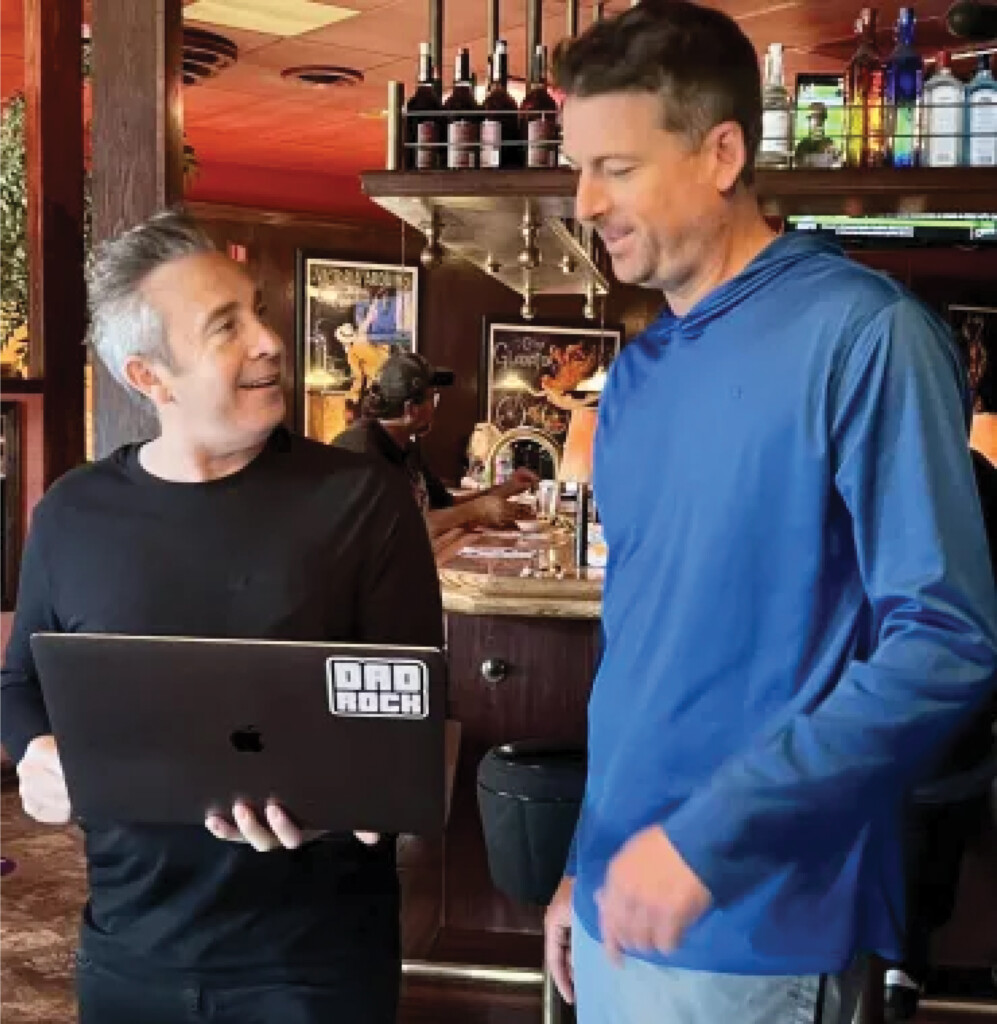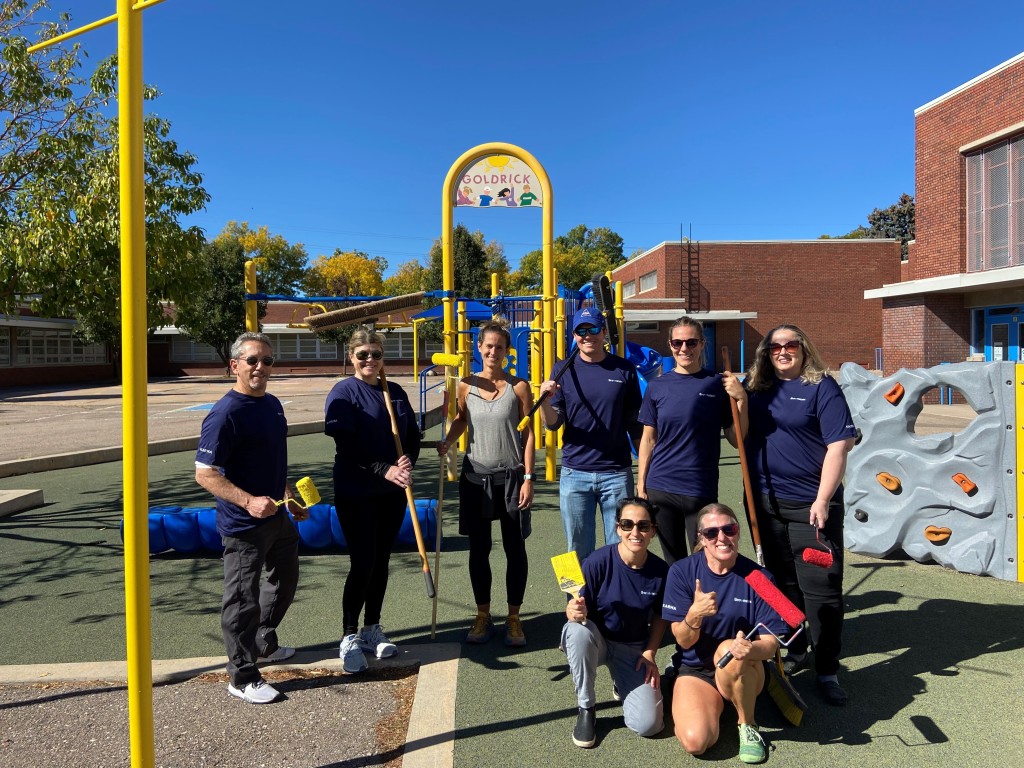A third-generation Colorado farmer, Marc Arnusch grows barley and other grains on 2,200 acres in the Prospect Valley east of Keenesburg.
His son, Brett, joined Marc Arnusch Farms after he graduated from Colorado State University’s College of Agricultural Sciences in 2018. “We didn’t know if he’d come back to the farm or not,” Arnusch says.
But Brett did come back to the farm, and as the chief technology officer implemented soil moisture probes and drone imaging. He also helped develop proprietary software to manage the farm’s operations.
“Halfway through college, he discovered there was a whole new environment in production agriculture on the tech side,” Marc Says.
Brett has implemented precision technology in the farm’s irrigation system while integrating a wide range of data on planting schedules, weather and crop protection into the farm’s decision-making process.
“He’s really helped us find next-level efficiencies,” Marc says. “We’re just making decisions quicker, and decisions are made easier.”

One example: Soil moisture probes revealed some hail-stricken crops were not going to survive in summer 2018, so the farm turned off the spigots and other inputs. “We knew the crop was giving it up, and that saved us a significant amount of investment that ordinarily we would have put into the crop,” Marc says.
Marc says he likes to be a smart adopter instead of an early one, but notes that the farm—and agriculture as a whole—is often on the cutting edge. “We’ve had autonomous, self-driving tractors since the early 2000s,” he notes. “Adopting the right technology on our farm has rewarded us so far.”
The operation is currently beta-testing a sensor-driven irrigation system to more efficiently water the crops. “It’s basically looking inside the plant we can’t get inside of as farmers and agronomists.”
“Without question, I would say technology has reduced our dependence on labor, and we’re coming up with better quality,” Marc says. “We have to continue to adopt these technologies to survive, evolve and innovate.”

He adds, “Sustainability starts with having a profit, because if we can’t meet our obligations to others, we’re not going to be here.”
Arnusch Farms is not unique. “Agriculture’s always been technologically sophisticated, it just doesn’t look like it to the outside observer,” says Gregory Graff, who has been researching the rise in investment in agtech at Colorado State University for nearly a decade. “People see lots of mud and broken-down equipment and stuff like that.”
Annual worldwide investment in agtech was hovering around $200 million until it took off starting in 2007 and exploded when Monsanto bought weather modeling startup The Climate Corp. in 2013 for about $1 billion.
“Suddenly, cha-ching!” says Graff, a professor in CSU’s Department of Agricultural and Resource Economics. “Venture capital more or less drank the Kool-Aid, whatever analogy you want, but they really bought the storyline that agriculture was an undiscovered behemoth of an industry ripe for disruption technologically.”
While noting there was “a bit of hubris” in the investment community’s mindset, Graff points to AgFunder’s 2022 report as a sign of the times: It pegged foodtech and agtech investments at $52 billion worldwide in 2021, up a whopping 86% over 2020. Agtech is about a third of that, give or take.
The numbers depend, of course, on what you count: Most agtech can be categorized as biotech, chemistry, software or mechanics, but some analysts lump in B2C platforms and other food-centric models. “It’s so diffuse, nobody understands how big it is,” Graff says. “And the venture capital investment has absolutely surged since that 2013 shot over the bow. These last 10 years have seen a runup of enormous scale.”
How has all of this investment affected farmers and ranchers? “It’s given them password anxiety,” laughs Graff.

Passwords aside, he adds, “I think what you’ve seen the farmers doing is adopting piecemeal and pretty conservatively relative to what the tech optimists would have liked—or even would want you to believe, especially if you’re a VC investor thinking about putting money into them.”
Regardless, Colorado is at the forefront, with an agtech cluster that’s gaining international attention. Startup Genome ranked Denver-Boulder fifth in the world for its agtech and food startup ecosystem in its 2022 report on the sector. “I can say confidently we’re one of the leading hubs in the country,” notes Graff, who tracks 110 active agtech companies in the state. “Silicon Valley always wins, no matter what, but they’re winning by less and less lately.”
Saving labor with wireless cameras
And many of Colorado’s ag-focused startups are gaining traction. Take Barn Owl Tech in Colorado Springs. Founder and CEO Josh Phifer was raised on livestock ranches in Wyoming and Nebraska. “I grew up with the problems of having assets spread out over dozens if not hundreds of square miles,” he says.
After Phifer served in the U.S. Air Force, he saw the possibility of using wireless cameras on farms and ranches during his military experience and launched Barn Owl in 2016.
“At a large farm or ranch, they spend about 30% of their labor literally just checking on things, driving around and checking on things,” Phifer says. “If you have a fully deployed set of cameras, you can cut that down by more than half, so you’re saving 15 to 20 percent of your overall labor. If you grew up in ranching, you know there’s always more work to do, so it’s not that we’re replacing labor, we’re just giving the time back to do more effective and
efficient things.”
Revenue has been increasing at an annual clip of 250% in recent years, Phifer says, with about 60% of sales going to agricultural customers.
“Farming has become very technology-dependent, everything from automated tractors to GPS-guided fertilizing and planting,” Phifer says. “The livestock side tends to be a little more old-school. Just by the nature of raising young animals, it has to be a more hands-on operation.”

Not that livestock operations don’t have increasingly innovative options: Australia-based AgriWebb, offering livestock ranchers a cloud-based platform to manage their operations, chose Denver over Austin, Dallas and Salt Lake City for its North American headquarters in 2020.
Denver “is the confluence of all of the things we were looking for,” says AgriWebb CEO Kevin Baum. “It’s got a great, thriving and growing technology scene, it is a regional headquarters for so many ag businesses and partners, it is geographically near where our market is in the middle of the country, it has a hub airport, and it’s a great place to live. It ticked all of our boxes, and it wasn’t much of a competition.”
Baum says livestock ranching has historically been “largely run by anecdote, which is a theme we’ve found all around the world. Most farms are managed on pen and paper.”
AgriWebb has gained traction since launching the platform in Australia in late 2015. “There was rapid adoption,” Baum says. “We’ve got about 12,000 users today. Right now, we’ve got about 17.5 million animals on the platform, which is eight times our closest competitor.”
The first employee in Denver, Coby Buck is a fifth-generation rancher. His family’s Wray Ranch in northeastern Colorado became an AgriWebb user soon after he joined the company, and it immediately paid dividends.
“They realized they were overfeeding their cattle in winter,” Baum says. “It was just bang! $80,000 in annual savings.”
That sort of anecdote has been part of the industry for millennia. “Agriculture has been developing technology since the beginning. It’s the original technology. That’s how you keep up,” he says.
“The next wave of that is digital adoption. Data is a tool. It is not a replacement. You still need that farmer, you still need that expertise, you need someone who knows what to do with the data.”
 Denver-based writer Eric Peterson is the author of Frommer’s Colorado, Frommer’s Montana & Wyoming, Frommer’s Yellowstone & Grand Teton National Parks and the Ramble series of guidebooks, featuring first-person travelogues covering everything from atomic landmarks in New Mexico to celebrity gone wrong in Hollywood. Peterson has also recently written about backpacking in Yosemite, cross-country skiing in Yellowstone and downhill skiing in Colorado for such publications as Denver’s Westword and The New York Daily News. He can be reached at [email protected]
Denver-based writer Eric Peterson is the author of Frommer’s Colorado, Frommer’s Montana & Wyoming, Frommer’s Yellowstone & Grand Teton National Parks and the Ramble series of guidebooks, featuring first-person travelogues covering everything from atomic landmarks in New Mexico to celebrity gone wrong in Hollywood. Peterson has also recently written about backpacking in Yosemite, cross-country skiing in Yellowstone and downhill skiing in Colorado for such publications as Denver’s Westword and The New York Daily News. He can be reached at [email protected]









 Jayme Ritchie is the Director of Community Relations for Brownstein Hyatt Farber Schreck.
Jayme Ritchie is the Director of Community Relations for Brownstein Hyatt Farber Schreck.